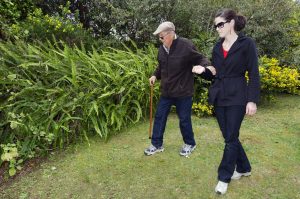How to Care for Yourself When You are a Caregiver
As the population continues to grow, so does the need for caregivers. Most caregiving is given by those who are not in the health care business and are not professionals – it is becoming quite popular to do-it-yourself. These impromptu caregivers provide eighty percent of care for their loved ones in the United States.
A caregiver is defined by anyone who provides help to another person in need. This can be an elderly parent, a spouse, a child or a relative. These caregivers are providing help to loved ones and do not identify themselves as caregivers. Once they recognize themselves as caregivers they can start to take care of themselves and receive the support they need.
‘Caregiving is very rewarding, but extremely stressful.’
Many people feel it is part of their core values and the right thing to do to help a loved one in any way that they can and they should, but they need to keep in mind how to care for themselves.
Once they start to feel overwhelmingly tired, alone or sad, they need to recognize these emotions and start to gain control. Caregivers are vulnerable to health problems, both physically and mentally. Below are ways to care for yourself when you are a caregiver.

Photo Credit | Deposit Photo | @ lucidwaters
Focus on how you can help and understand your limitations. There is so much you can do to help your loved one, but there are limitations. Don’t try to do something that you are unable to do or to over extend yourself and your time. There is only so much time in the day – do what you can, when you can do it.
Set realistic goals. This goes hand and hand with above. Make a list and prioritize those goals according to your schedule.
Stay connected.
• Join a Support Group
• Take a Class on Caregiving
• Seek Social Support
Staying connected is the most important part of caring for yourself. As shown above, you should join a support group, take classes and seek social support. All of these connections will keep you talking with other caregivers. You can share your struggles and limitations, along with your goals and successes. These connections gives you the support from both family and people you do not know to speak freely about all areas of caregiving.
Below are links to some connections and resources.
National Association of Area Agencies on Aging
Family Caregiver Alliance – National Center on Caregiving
Seniors Resource Guide
Now that you are connected with other caregivers and you have read all resources and even taken a few classes, it is time to take care of yourself on a personal level.
Start by staying healthy. It is more difficult to care for someone else when you yourself aren’t healthy. Check out our sleeping and relaxation tips. Be sure to get regular checkups from your medical doctor as well as your dentist. (Look for signs of depression because this is very common in caregivers)
And most importantly, make time for yourself. Take at least an hour, maybe two a day to do something for yourself. Do something that makes you happy and relaxes you both physically and mentally. Remember to find coverage for your loved one while you out.
Becoming a caregiver voluntarily or even involuntarily takes a lot of strength and courage and you should commend yourself for your efforts! You are doing the right thing, but if you find that it is too much is also OK to find help and let someone else do it. Do what is right for your situation.